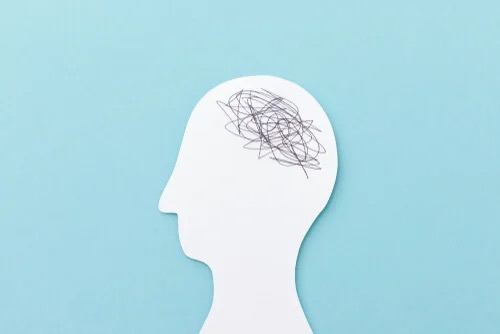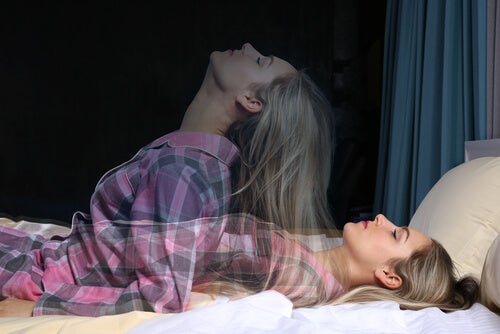We define anomalous experiences as out-of-the-ordinary events that are hard to interpret logically. Usually, they involve perceptual errors or hallucinatory phenomena. They occur when the brain fails to adequately process certain sensory stimuli.
In this article, we’ll explain what causes these experiences. We’ll also analyze how people process them and give them meaning. This process will always be dependent upon cultural factors, personality, and beliefs. For instance, say a person sees a shadow or a face when there’s nothing really there. This might mean different things to different people.
What are anomalous experiences?
We think of anomalous experiences as those that deviate from the common. We can interpret them both positively and negatively. However, we can never reduce them to mere pathological events.
Thomas Rabeyron, from the psychology department of the University of Nantes, suggests the main anomalous experiences are:
- Unusual perceptual interaction. In other words, people feel, smell, or see something weird or unusual.
- Vision and appearance of an unusual and pseudo hallucinatory presence. For example, people might see a shadow or a more detailed shape.
- Out of body experience. Phenomena of sensory desynchronization. The person sees their body from the perspective of a third party.
- Near-death experiences. Coma patients or those involved in accidents have revealing visions or experiences.
- Communication with the dead. People claim to feel the presence of or communicate with the deceased.
- Mystical experiences. People experience astral journeys or connections with gods and strange beings.
- Alien abductions. People maintain they have contact with beings from another world. These experiences tend to be culturally dependent.
Study model of anomalous experiences
It’s important to note that these experiences have been classified according to patients’ reports. Therefore, the goal of the scientific approach here isn’t to analyze the authenticity of these experiences. Instead, it’s to study the psychological and organic mechanisms that contribute to their formation. Interestingly, these experiences are much more common than people tend to believe.
Currently, the following disciplines study this subject:
- Neuroscience. Advances in this field allow scientists to understand the neurological processes that occur in anomalous experiences. For example, sensory processing areas and how they’re altered by external factors.
- Psychology. This field focuses on finding the psychological variables that are associated with anomalous experiences. It also creates approach models.
The taboo of anomalous experiences
Most subjects who’ve had anomalous experiences tend to avoid consulting any professionals. In fact, they usually avoid the psychiatric circuit altogether. Therefore, how they interpret their experiences will always be linked to their individual beliefs. This means the true organic cause of the event tends to be ignored.
Many research studies suggest that anomalous experiences are common in the general population. Such studies suggest that they occur due to a specific misclassification in the brain.
Emotional and environmental conditions
Emotional and environmental conditions can positively or negatively affect anomalous experiences. As a matter of fact, the subject’s personal history and lifestyle will be crucial in how they understand them. Dynamic psychology suggests that they’re caused by poor integration of emotional experiences. This way, subjects would tend to outsource their thoughts and ideas that don’t fit into an internal system.
Does hallucinating mean madness?
We tend to associate hallucinations with forms of insanity. Indeed, it’s true that subjects with psychotic personality traits do experience hallucinations. However, people with other personality traits also experience them. One example is sleep paralysis. This is quite a common phenomenon. In fact, experts link its onset with traumatic experiences.
Cultural analysis
With regards to the specific case of sleep paralysis, we might see the anomalous experience as a way for the subject to confront their trauma. In fact, in most cases that require therapy, knowing what causes the phenomenon forms a fundamental part of the treatment.
Unfortunately, many subjects come to their own informal and cultural decisions regarding these experiences. They also might seek “alternative” therapies and help. They do this in order to avoid the psychiatric system at all costs. Unfortunately, this usually means their symptoms tend to worsen.
Associated personality factors
Personality is configured from an early age. Therefore, a traumatic experience can cause the subject to take refuge in fantasy as a defense mechanism. Furthermore, subjects who experience these phenomena tend to share certain characteristics. Among them are:
- Psychic permeability. These people are often overloaded with alien experiences. They frequently develop empathy disorders.
- A high degree of fantasy. They avoid rational explanations. In addition, they might take refuge on an imaginary plane.
- Hypersensitivity and suggestibility. Any event in or outside their environment becomes impregnated in their consciousness. It can then easily be transformed into intrusive thoughts.
- Openness to experience. They’re open to experiencing all types of different phenomena. We usually call these people mystics.

The process of symbolization
Defense mechanisms come into play here. People employ them when they find an idea or an event absolutely unbearable. Therefore, they’ll either give it a fictional meaning, suppress it completely, or externalize it. Rabeyron claims that this process occurs in two stages:
- Primary symbolization. The subject interprets and transforms their experiences at a non-verbal level.
- Secondary symbolization. The subject draws up a verbal description of their experience. Consequently, what they recount about their anomalous experience says a lot about their kind of internal processing.
Conclusion: more a science than a taboo
We can therefore conclude that the way in which an individual interprets an anomalous experience directly influences their life, as well as any possible pathological development. Advancements in science now allow biological and psychological explanations to take precedence over those of the mystical and paranormal. In fact, science has recently proved that anomalous experiences can also be artificially induced.
Finally, many health professionals don’t really know what to do when they’re faced with these cases. Without a doubt, they need the right tools so that they don’t automatically resort to medication or psychiatric referrals.
The post Anomalous Experiences and Symbolization appeared first on Exploring your mind.


















Comments